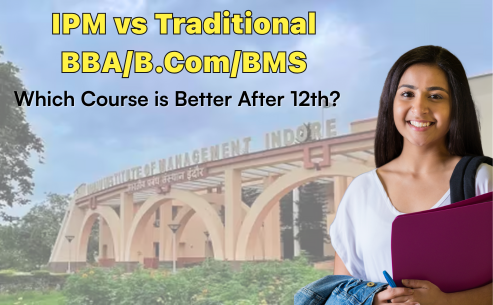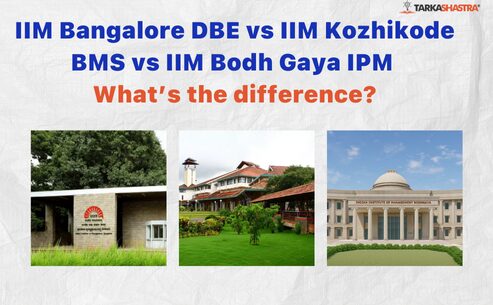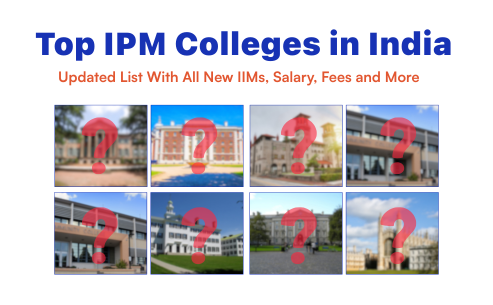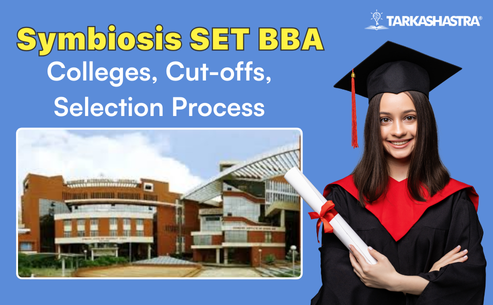Choosing the right undergraduate program after Class 12 is one of the most crucial academic decisions for any student. With multiple options available, aspirants often find themselves comparing the Integrated Program in Management (IPM) offered by the Indian Institutes of Management (IIMs) against traditional undergraduate courses like BBA, B.Com, and BMS.
This debate – “IPM vs BBA B.Com BMS” – is not just about course duration or fees, but about long-term career scope, placement opportunities, and the kind of academic exposure one receives. While traditional programs like BBA, B.Com, and BMS have been well-established for decades and continue to offer solid career pathways, IPM is a relatively newer yet highly prestigious option that integrates undergraduate and postgraduate management education into a single five-year journey.
At Tarkashastra, we meet hundreds of Class 12 students every year who ask the same question: Which is better for me – IPM or a traditional BBA/B.Com/BMS course? The answer lies in understanding how each program differs in terms of eligibility, admission process, fees, curriculum, placements, and long-term growth.
In this blog, we will do a detailed comparison of IPM vs traditional courses after 12th to help you decide which program suits your goals better.
What is IPM?
The Integrated Program in Management (IPM) is a five-year dual-degree program launched by the Indian Institutes of Management (IIMs) to nurture young leaders right after Class 12. It combines an undergraduate curriculum (first 3 years) with a postgraduate MBA curriculum (last 2 years), making it one of the most sought-after management programs in India.
First introduced by IIM Indore in 2011, IPM has now expanded to multiple IIMs, including IIM Rohtak, IIM Ranchi, IIM Jammu, IIM Bodh Gaya, and IIM Shillong. With the rising popularity of management education, IPM is steadily becoming a strong alternative to traditional UG programs like BBA, B.Com, and BMS.
Key Features of IPM
- Duration: 5 years (Integrated UG + MBA)
- Degree Awarded: BA/BBA/BMS + MBA (depending on institute)
- Eligibility: Students from any stream (Commerce, Science, Humanities) after Class 12 can apply.
- Selection Process: Entrance exams like IPMAT Indore, IPMAT Rohtak, and JIPMAT, followed by a Personal Interview.
- Curriculum Focus: A unique blend of liberal arts, social sciences, economics, mathematics, and business management.
Why is IPM Different from Traditional Courses?
Unlike a standalone BBA, B.Com, or BMS, IPM offers a direct pathway to an MBA from an IIM – without needing to reappear for CAT or other MBA entrances after graduation. This means students secure a spot in India’s most prestigious B-schools right after Class 12, provided they clear the competitive entrance exams.
Here’s a quick comparison snapshot:
| Factor | IPM (IIMs) | Traditional UG (BBA/B.Com/BMS) |
| Academic Journey | UG (3 yrs) + MBA (2 yrs) in one stretch | UG only (MBA optional after graduation) |
| Degree | Integrated MBA | UG degree (BBA/B.Com/BMS) |
| Exam Required | IPMAT Indore, IPMAT Rohtak, JIPMAT | CUET, NPAT, SET, CET, Merit-based |
| Flexibility | Fixed path toward MBA | Flexible for MBA/CA/CFA/Govt exams |
| Prestige | IIM brand recognition | Depends on college/university |
Relevance for Students After Class 12
- For aspirants who are clear about a management career, IPM saves time, energy, and uncertainty by integrating both degrees.
- It is ideal for students aiming to secure their MBA dream early, without having to go through the highly competitive CAT exam after graduation.
- However, students who want flexibility in career choices (finance, accounting, law, UPSC, entrepreneurship) may prefer traditional UG programs.
What are Traditional UG Programs (BBA, B.Com, BMS)?
While the IPM route offers a direct entry into IIMs, most students in India still opt for traditional undergraduate programs such as BBA, B.Com, and BMS after Class 12. These courses are well-established, widely available, and provide multiple career pathways depending on a student’s interests.
1. Bachelor of Business Administration (BBA)
- Duration: 3 years
- Focus: Management, marketing, finance, and entrepreneurship basics.
- Popular Colleges: NMIMS (Mumbai), Symbiosis (Pune), Christ University (Bangalore), DU colleges (via CUET).
- Career Scope: Many students pursue an MBA after BBA, while others explore careers in marketing, HR, or family business.
2. Bachelor of Commerce (B.Com)
- Duration: 3 years
- Focus: Accounting, taxation, auditing, finance, and economics.
- Popular Colleges: SRCC (Delhi), Hindu College (Delhi), Loyola College (Chennai), St. Xavier’s (Mumbai).
- Career Scope: Highly popular among commerce students aiming for CA, CFA, MBA, UPSC, or banking exams.
3. Bachelor of Management Studies (BMS)
- Duration: 3 years
- Focus: Business analytics, management, organisational behaviour, and strategy.
- Popular Colleges: Mumbai University-affiliated colleges like HR College, Jai Hind, St. Xavier’s.
- Career Scope: Similar to BBA but often considered more analytical; graduates pursue MBA, MMS, or specialised master’s programs.
Traditional Courses vs IPM Snapshot
| Course | Duration | Entrance Pathways | Key Focus | Post-Graduation Options |
| BBA | 3 years | CUET, NPAT, SET, BBA CET, direct admission | Business & Management fundamentals | MBA, PGDM, Family Business |
| B.Com | 3 years | CUET, merit-based admissions | Commerce, Accounting, Finance | CA, CFA, MBA, UPSC, M.Com |
| BMS | 3 years | BBA CET, CUET, merit-based | Business & Strategy, Analytics | MBA, MMS, Corporate Jobs |
| IPM (IIMs) | 5 years (Integrated) | IPMAT Indore/Rohtak, JIPMAT | Liberal Arts + Business + MBA | Direct MBA from IIM |
Why Students Still Choose Traditional UG Programs?
- Flexibility: Students can decide their career direction later (finance, MBA, UPSC, CA, etc.).
- Affordability: Offers a lower fee structure compared to IPM.
- Accessibility: Thousands of colleges across India offer BBA/B.Com/BMS.
- Specialisation: Commerce-heavy students often find B.Com more aligned with their interests.
Admission Process – IPM vs BBA/B.Com/BMS
One of the most significant differences between IPM and traditional UG courses lies in their admission process. While most BBA, B.Com, and BMS programs rely on university-level entrances or merit-based admissions, IPM aspirants must clear specialised and highly competitive entrance tests conducted by IIMs.
Admission to IPM (IIMs)
- Entrance exams:
- IPMAT Indore (for IIM Indore)
- IPMAT Rohtak (for IIM Rohtak)
- JIPMAT (for IIM Jammu & IIM Bodh Gaya)
- Selection process: Written Aptitude Test + Personal Interview.
- Difficulty level: High, as thousands of aspirants compete for limited seats across IIMs.
Admission to BBA/B.Com/BMS
- BBA: Through exams like CUET, NPAT (NMIMS), SET (Symbiosis), BBA CET (Maharashtra), or direct admission based on Class 12 marks.
- B.Com: Mostly merit-based (Class 12 scores via CUET), making it the most accessible UG commerce course.
- BMS: Admissions through CUET, Maharashtra BBA CET, or Mumbai University’s selection process.
- Difficulty level: Moderate, varying by college/university.
Comparison Table – IPM vs Traditional UG Admission
| Parameter | IPM (IIMs) | BBA | B.Com | BMS |
| Entrance Exams | IPMAT Indore/Rohtak, JIPMAT | CUET, NPAT, SET, BBA CET | CUET, merit-based | CUET, BBA CET, Mumbai Univ. tests |
| Selection Rounds | Exam + PI/WAT | Exam + GD/PI (some colleges) | Merit (Class 12 scores) | Exam + PI (varies) |
| Competition Level | Very High (national-level) | Moderate–High (depends on college) | Moderate (high cutoff in top colleges) | Moderate |
| Eligibility | Class 12 (any stream) | Class 12 (any stream) | Class 12 (commerce preferred) | Class 12 (any stream) |
| Seats Available | Limited (few hundred per IIM) | Thousands across India | Widely available | Limited to select universities |
Key Takeaway
- IPM admissions are highly selective, demanding strong aptitude and interview skills.
- BBA/B.Com/BMS admissions are relatively more straightforward to crack. However, entry into top-tier colleges like NMIMS, Symbiosis, DU, or SRCC remains competitive.
Curriculum Comparison – Integrated MBA vs Traditional UG
The curriculum is where the difference between IPM and traditional UG programs becomes most evident. IPM is designed as a 5-year holistic journey blending liberal arts, social sciences, quantitative subjects, and management. At the same time, BBA, B.Com, and BMS follow a 3-year undergraduate framework with scope for further studies.
IPM Curriculum (IIMs)
- First 3 Years (UG phase):
- Subjects: Economics, Psychology, Literature, Mathematics, Statistics, Social Sciences, and Business Foundation courses.
- Focus: Develops analytical, communication, and problem-solving skills.
- Last 2 Years (PG phase):
- MBA-level coursework with electives in Finance, Marketing, Consulting, Strategy, HR, Operations, etc.
- Same curriculum as flagship MBA students at IIMs.
- Unique Edge: Interdisciplinary learning + guaranteed MBA seat at a top IIM.
BBA Curriculum
- Duration: 3 years
- Core areas: Principles of Management, Marketing, Finance, Human Resources, Business Law, IT in Business.
- Outcome: Prepares students for entry-level corporate roles, with MBA as the natural next step.
B.Com Curriculum
- Duration: 3 years
- Core areas: Accounting, Taxation, Auditing, Business Economics, Costing, Corporate Law.
- Outcome: Creates a strong foundation in finance and commerce; students often pursue CA, CFA, MBA, UPSC, or M.Com after B.Com.
BMS Curriculum
- Duration: 3 years
- Core areas: Business Policy, Organisational Behaviour, Managerial Economics, Operations Research, Entrepreneurship.
- Outcome: More analytical than BBA; students often move to MBA or MMS for advanced studies.
Curriculum Comparison Table
| Course | Duration | Core Subjects | Special Features | Outcome |
| IPM | 5 years | Economics, Liberal Arts, Quantitative Methods, Business, MBA core subjects | Blend of UG + MBA, research, internships | Direct MBA from IIM |
| BBA | 3 years | Management, HR, Finance, Marketing, Business Law | Industry-oriented, business basics | Entry-level jobs, MBA |
| B.Com | 3 years | Accounting, Finance, Taxation, Auditing, Economics | Commerce-focused, finance-heavy | CA, CFA, MBA, UPSC |
| BMS | 3 years | Business Policy, Strategy, Analytics, OB, Entrepreneurship | Analytical + managerial exposure | MBA, MMS, corporate jobs |
Key Takeaway
- IPM Curriculum = Broad + Deep: Starts with liberal arts & quantitative foundation, ends with an IIM MBA.
- Traditional UG Curriculum = Specialised: Focuses on business or commerce fundamentals, requiring post-graduation (MBA, CA, CFA, etc.) for advanced career growth.
Fees & ROI – IPM vs BBA/B.Com/BMS
When choosing between IPM and traditional UG programs, the cost of education is often a deciding factor. IPM, being a 5-year integrated program at IIMs, comes with a significantly higher fee structure compared to BBA, B.Com, or BMS. However, the return on investment (ROI) often justifies the cost due to premium IIM placements.
IPM Fees (IIMs)
- Range: ₹25–30 lakhs for 5 years (IIM Indore, IIM Rohtak, IIM Ranchi, etc.).
- Additional costs: Hostel, mess, and personal expenses.
- ROI: High, since placements align with IIM’s flagship MBA (average packages often above ₹20–25 LPA at older IIMs).
BBA Fees
- Range: ₹3–12 lakhs for 3 years (depending on the college—private universities like NMIMS are on the higher end; government colleges are much lower).
- ROI: Varies—top colleges like NMIMS, Symbiosis, Christ give decent placements, but an MBA is usually required for higher ROI.
B.Com Fees
- Range: ₹50,000–₹2 lakhs (government and university-affiliated colleges).
- ROI: Very cost-effective, but career growth depends on additional qualifications like CA, CFA, or MBA.
BMS Fees
- Range: ₹1–5 lakhs, depending on the college affiliated with Mumbai University.
- ROI: Moderate; placements rely heavily on the college brand. Students often pursue an MMS or an MBA for career advancement.
Fees & ROI Comparison Table
| Course | Duration | Fees (Approx.) | Placement/ROI Potential |
| IPM (IIMs) | 5 years | ₹25–30 lakhs | High ROI (₹20–40 LPA placements at top IIMs) |
| BBA | 3 years | ₹3–12 lakhs | Moderate (₹4–8 LPA; MBA boosts ROI) |
| B.Com | 3 years | ₹50k–2 lakhs | Cost-effective; ROI grows with CA/CFA/MBA |
| BMS | 3 years | ₹1–5 lakhs | Moderate; depends on Mumbai Univ. college reputation |
Key Takeaway
- IPM = High Cost, High Reward → Great for students who can invest upfront and aim for elite corporate careers.
- BBA/B.Com/BMS = Lower Cost, Flexible ROI → Safer on the pocket, but requires further studies (MBA, CA, CFA, etc.) for high-paying roles.
Placement Opportunities – IPM vs Traditional UG Programs
The end goal of any undergraduate course is career opportunities, and here the difference between IPM and traditional UG programs is most striking.
IPM Placements (IIMs)
- Students completing the 5-year IPM program at IIM Indore, Rohtak, Ranchi, Jammu, or Bodh Gaya are absorbed into the MBA placement pool of their respective IIMs.
- This means they get the same opportunities as flagship MBA students, including consulting, finance, FMCG, and tech giants.
- Average packages at IIM Indore and IIM Rohtak MBA placements often cross ₹20–25 LPA, with top offers going beyond ₹40 LPA.
- Recruiters include McKinsey, BCG, Deloitte, JP Morgan, Goldman Sachs, HUL, Amazon, Microsoft, and the Tata Group.
BBA Placements
- Highly dependent on the college brand.
- Top BBA colleges like NMIMS, Symbiosis, Christ, and DU’s Shaheed Sukhdev College offer packages in the range of ₹5–8 LPA on average.
- Tier-2 and private colleges often have much weaker placement support, leading students to pursue an MBA for better opportunities.
B.Com Placements
- Traditionally, it is not placement-driven, since B.Com is considered an academic foundation course.
- Colleges like SRCC, Hindu, and St. Xavier’s may offer roles in accounting, banking, and finance with packages between ₹4–7 LPA.
- The majority of students, however, opt for professional courses (CA, CFA, UPSC) or prepare for an MBA.
BMS Placements
- Stronger in Mumbai University-affiliated colleges, especially HR College, Jai Hind, and St. Xavier’s.
- Average packages generally range from ₹4–6 LPA, with some students moving on to MMS or MBA for higher salaries.
Placements Comparison Table
| Course | Average Package | Top Recruiters | Placement Scope |
| IPM (IIMs) | ₹20–40 LPA | McKinsey, BCG, JP Morgan, Amazon, HUL | IIM MBA placement pool |
| BBA | ₹4–8 LPA (top colleges) | Deloitte, EY, KPMG, ICICI, Axis Bank | College-dependent |
| B.Com | ₹3–6 LPA (top DU colleges) | Big 4 firms, Banks, Startups | Limited, better with CA/CFA |
| BMS | ₹4–6 LPA (Mumbai Univ. tier-1) | Consulting firms, BFSI, FMCG | Stronger in reputed Mumbai colleges |
Key Takeaway
- IPM = Assured entry into IIM MBA placements, making it a high-return pathway.
- BBA/B.Com/BMS = Opportunities vary sharply by college—students from top institutes get good roles. Still, most aspirants need to pursue an MBA/CA/CFA for competitive salaries.
Career Scope & Higher Studies Path
When deciding between IPM and traditional UG programs, students must look beyond the degree and consider long-term career prospects and opportunities for further studies. Both pathways offer opportunities, but the scope and journey differ significantly.
Career Scope after IPM
- Direct entry into IIM MBA placements, which are among the best in India.
- Roles in consulting, finance, FMCG, technology, and international management.
- Global exposure through exchange programs, research projects, and corporate internships.
- Alumni often move into leadership positions early, given the IIM advantage.
- This is popular among students seeking a secure, management-focused career path.
Career Scope after BBA
- Graduates may enter entry-level corporate roles in HR, marketing, or sales.
- Most students pursue an MBA for career acceleration.
- Some choose to join family businesses or startups, leveraging their business knowledge.
- International study options (GMAT/GRE-based MBA abroad) remain open.
Career Scope after B.Com
- Strong foundation for professional qualifications like CA, CFA, CS, FRM, or UPSC.
- B.Com + CA/CFA is one of the most respected and rewarding combinations in India.
- MBA after B.Com is another popular choice, especially for those seeking managerial roles.
- Flexibility to explore careers in banking, auditing, accounting, public policy, and academia.
Career Scope after BMS
- Corporate roles in consulting, strategy, or operations (depending on college).
- Many pursue an MBA/MMS for career advancement.
- Opportunities in startups and SMEs are stronger due to hands-on managerial exposure.
Higher Studies Path – Comparison Snapshot
| Course | Common Higher Studies Options | Long-Term Career Scope |
| IPM | MBA (built-in), International MBA, Fellow Programs | Leadership roles in consulting, finance, marketing, global firms |
| BBA | MBA, PGDM, GMAT/GRE for global MBAs | Entry-level jobs → MBA → Managerial careers |
| B.Com | CA, CFA, CS, M.Com, MBA, UPSC | Finance, accounting, auditing, government, MBA roles |
| BMS | MBA, MMS, Specialized Masters | Strategy, analytics, consulting, management roles |
Key Takeaway
- IPM = Direct IIM MBA + assured top placements → best for students committed to management careers.
- BBA/B.Com/BMS = Flexible pathways → better for students who want to explore multiple domains (finance, UPSC, entrepreneurship, CA, etc.).
Which Students Should Choose What?
Every student has unique strengths, financial considerations, and career ambitions. Choosing between IPM and traditional UG programs (BBA/B.Com/BMS) should be based on a careful evaluation of personal goals.
Who Should Choose IPM?
- Students who are sure about pursuing management as a career.
- Those seeking early access to the IIM brand and a guaranteed MBA pathway.
- Students willing to handle intense competition (IPMAT/JIPMAT) and invest in a higher fee structure.
- Aspirants who value global exposure, interdisciplinary learning, and corporate-ready grooming.
- Commerce, Science, or Humanities students seeking a direct path to elite consulting/finance/strategy careers.
Who Should Choose BBA?
- Students who want a foundation in business and management, but at a lower cost than IPM.
- Those who may aim for an MBA later from IIMs/abroad through CAT or GMAT.
- Students considering entrepreneurship or family business.
- Aspirants seeking flexible study options with private universities (Symbiosis, NMIMS, Christ, etc.).
Who Should Choose B.Com?
- Students who are finance/accounting-oriented and may pursue CA, CFA, CS, FRM, UPSC, or M.Com.
- Aspirants looking for an affordable yet solid academic foundation.
- Those who are undecided about pursuing an MBA but want multiple career paths (finance, government, academia).
Who Should Choose BMS?
- Students from Mumbai or similar regions where BMS is a recognised program under universities.
- Those interested in a mix of analytics, strategy, and management exposure.
- Aspirants who may later pursue MBA/MMS for advanced roles.
Decision Matrix: IPM vs Traditional Courses After 12th
| Student Profile | Best Fit | Why |
| Wants direct IIM MBA, brand value, top placements | IPM | Early career head start, IIM network |
| Business-minded, may aim for MBA later | BBA | Balanced exposure to business + flexible future |
| Finance/accounting-focused, may do CA/CFA/UPSC | B.Com | Cost-effective, wide career choices |
| Mumbai-based, strategy/analytics-oriented | BMS | University recognition, pathway to MMS/MBA |
Key Takeaway
- IPM is ideal for focused students who want to lock in an IIM MBA early.
- BBA/B.Com/BMS are better for students who wish for flexibility, affordability, and multiple pathways.
Final Note
Your career is not defined by the degree alone, but by the preparation, mentorship, and opportunities you embrace along the way. Both IPM and traditional UG programs can lead to rewarding careers if chosen wisely.
At the end of the day, there is no single “better” option—the right choice depends on your goals, strengths, and financial situation.
This is where Tarkashastra steps in. With years of expertise in mentoring aspirants, we:
- Prepare students for IPMAT (Indore/Rohtak), JIPMAT, CUET, NPAT, SET, and BBA CET.
- Provide personalised guidance to help students evaluate which program—IPM or traditional UG—fits their long-term vision.
- Offer mock tests, strategy sessions, and one-on-one mentorship from experts who have themselves cleared top entrances and studied at leading institutes.
Whether you dream of an IIM journey through IPM or prefer the flexible path of a BBA/B.Com/BMS, Tarkashastra ensures you are prepared, confident, and future-ready.
FAQs
1. What is IPM, and how is it different from traditional BBA/B.Com/BMS courses?
IPM is a 5-year Integrated Program in Management offered by IIMs, combining UG and MBA in one stretch. Traditional programs like BBA, B.Com, and BMS are 3-year undergraduate courses with the flexibility to pursue MBA or other qualifications later.
2. Which course offers better career opportunities: IPM or BBA/B.Com/BMS?
IPM graduates join IIM MBA placements, where average packages are ₹20–40 LPA. BBA/B.Com/BMS offer decent placements at top colleges, but most students pursue MBA, CA, or CFA for stronger career growth.
3. How does the admission process differ for IPM vs traditional UG courses?
IPM requires IPMAT Indore, IPMAT Rohtak, or JIPMAT, followed by interviews. Traditional UG courses are admitted through CUET, NPAT, SET, BBA CET, or merit-based admissions.
4. Which program offers better placements: IPM or traditional BBA/B.Com/BMS?
IPM students get IIM MBA placements (consulting, finance, FMCG, tech) with top global recruiters. BBA/B.Com/BMS placements vary widely by college—strong in tier-1 colleges, weaker in average ones.
5. Is IPM a good option for students from a Commerce background?
Yes, Commerce students find IPM ideal since it combines management fundamentals with advanced MBA-level learning, while still keeping finance and economics as strong components.
6. Can Science students pursue IPM instead of B.Com or BBA?
Absolutely. IPM is open to all streams (Commerce, Science, Humanities). Many science students prefer to pursue IPM careers in business and management.
7. How is the curriculum of IPM different from BBA/B.Com/BMS?
IPM offers a liberal arts + business + MBA curriculum in 5 years. BBA focuses on business basics, B.Com on finance/accounting, and BMS on strategy/analytics.
8. Which has better ROI: IPM from an IIM or BBA from a private college?
IPM at IIMs delivers higher ROI because placements align with flagship IIM MBA packages. BBA ROI depends heavily on the college; private universities may require further investment in an MBA for better returns.
9. Does IPM guarantee better international opportunities than traditional courses?
Yes. IPM students gain global exposure through exchange programs, and the IIM brand is highly recognised abroad. Traditional UG students need to apply separately for international MBAs.
10. Which exam is required for IPM, and how is it different from BBA entrances?
IPM requires IPMAT Indore, IPMAT Rohtak, or JIPMAT. These tests focus heavily on Quantitative Aptitude and Verbal Ability. They are tougher than typical BBA entrances, such as NPAT or SET.
11. Is IPM tougher to get into than BBA or B.Com?
Yes. With limited seats and national-level competition, IPM is much harder to crack compared to BBA/B.Com/BMS, where thousands of colleges offer entry.
12. Should students choose IPM for long-term career growth over traditional UG programs?
If management is your clear goal, IPM is the better choice. If you want flexibility (finance, UPSC, law, CA, entrepreneurship), then BBA/B.Com/BMS might be more suitable.







